21 start with Q start with Q

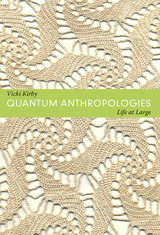
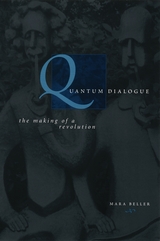
Beller draws her argument from her radical new reading of the history of the quantum revolution, especially the development of the Copenhagen interpretation. One of several competing approaches, this version succeeded largely due to the rhetorical skills of Niels Bohr and his colleagues. Using extensive archival research, Beller shows how Bohr and others marketed their views, misrepresenting and dismissing their opponents as "unreasonable" and championing their own not always coherent or well-supported position as "inevitable."
Quantum Dialogue, winner of the 1999 Morris D. Forkosch Prize of the Journal of the History of Ideas, will fascinate everyone interested in how stories of "scientific revolutions" are constructed and "scientific consensus" achieved.
"[A]n intellectually stimulating piece of work, energised by a distinct point of view."—Dipankar Home, Times Higher Education Supplement
"[R]emarkable and original. . . . [Beller's] arguments are thoroughly supported and her conclusions are meticulously argued. . . . This is an important book that all who are interested in the emergence of quantum mechanics will want to read."—William Evenson, History of Physics Newsletter
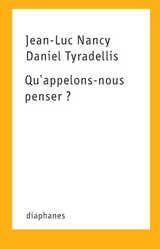
Cet échange rare et singulier traite de la précarité de toute pensée, qu’elle s’établisse dans la langue, dans l’image, dans le corps ou dans l’espace ; du nous et de la pensée partagée qui ouvre les possibilités du sens. Il dessine une pensée qui s’épuise, mais qui aime aussi, et nous redonne foi en l’existence.
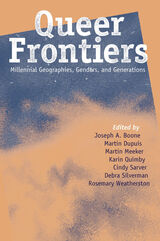
From the history of gay and lesbian studies to the emergence of video bars, from an interview with playwright Cherrie Moraga to a photo record of 1950s gay Los Angeles, these original essays tackle the past, present, and future of queer sexuality from all directions. Queer Frontiers brings together the most vital and energetic voices around; whether promising young scholar or veteran of gay activism, each contributor is helping to move the debate into uncharted territory.
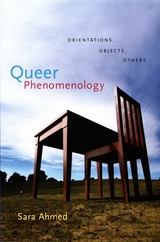
Ahmed proposes that a queer phenomenology might investigate not only how the concept of orientation is informed by phenomenology but also the orientation of phenomenology itself. Thus she reflects on the significance of the objects that appear—and those that do not—as signs of orientation in classic phenomenological texts such as Husserl’s Ideas. In developing a queer model of orientations, she combines readings of phenomenological texts—by Husserl, Heidegger, Merleau-Ponty, and Fanon—with insights drawn from queer studies, feminist theory, critical race theory, Marxism, and psychoanalysis. Queer Phenomenology points queer theory in bold new directions.
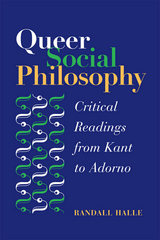
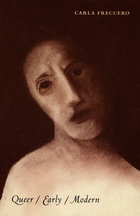
Combining feminist theory, queer theory, psychoanalysis, deconstruction, and literary criticism, Freccero takes up a series of theoretical and historical issues related to debates in queer theory, feminist theory, the history of sexuality, and early modern studies. She juxtaposes readings of early and late modern texts, discussing the lyric poetry of Petrarch, Louise Labé, and Melissa Ethridge; David Halperin’s take on Michel Foucault via Apuleius’s The Golden Ass and Boccaccio’s Decameron; and France’s domestic partner legislation in connection with Marguerite de Navarre’s Heptameron. Turning to French cleric Jean de Léry’s account, published in 1578, of having witnessed cannibalism and religious rituals in Brazil some twenty years earlier and to the twentieth-century Brandon Teena case, Freccero draws on Jacques Derrida’s concept of spectrality to propose both an ethics and a mode of interpretation that acknowledges and is inspired by the haunting of the present by the past.
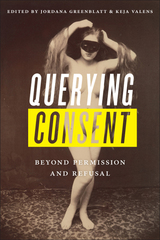

A concise, yet engaging introduction to the field of ethics, this volume offers a systematic study of the foundations of moral responsibility. Montague Brown guides the reader on an examination of a wide range of ethical positions, including relativism, emotivism, egoism, utilitarianism, Kantian formalism, and natural law.
Brown explains not only the history behind the development of each position, but also the roles science, democracy, and religion play in moral thinking today.
Students and teachers of philosophy, ethics, and religion, as well as the general reader, will find that this book tackles the serious issues and offers an insightful, accessible introduction to major ethical positions and the great moral philosophers.
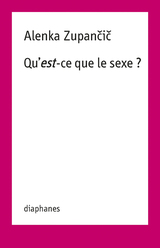
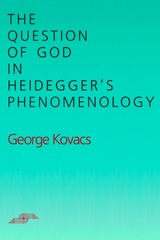
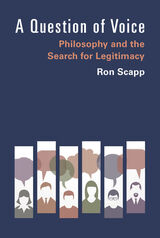
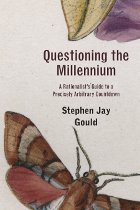

Questions of Form was first published in 1989. Minnesota Archive Editions uses digital technology to make long-unavailable books once again accessible, and are published unaltered from the original University of Minnesota Press editions.
In Questions on Form, Joelle Proust traces the concept of the analytic proposition from Kant's development of the notion down to its place in the work of Rudolf Carnap, a founder of logical empiricism and a key figure in contemporary analytic philosophy. Using a method known in France as topique comparative,she provides a rigorous exposition of analyticity, situating it within four major philosophical systems—those of Kant, Bolzano, Frege, and Carnap—and clearly delineating its development from one system to the next.
Proust takes as her point of departure Kant's distinction between analytic and synthetic judgments. Though she makes clear that Kant drew on Locke, Hume, and Leibniz, she argues that his notion of analyticity was innovative, not simply an elaboration of something already found in their work. She shows that the analytic proposition unexpectedly (given its modest status in Kant) came to play an important part in efforts to convert problems considered "transcendental" into questions of belonging to formal logic.
Ultimately, her comparison of their systems reveals that the concept of the analytic, however specific its rile in each, remains linked to a foundationalist strategy—in effect, to the transcendentalist questions Kant used when he reinterpreted the findings of his empiricist predecessors. Hence, this book's provocative claim: today's so-called logical empiricism owes much more to Kant's notion of science than to Hume's.
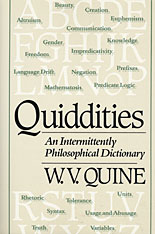
The appellation “polymath” is often lightly bestowed, but it can be applied with confidence to the celebrated philosopher Willard Van Orman Quine. Quine’s areas of interest are panoramic, as this lively book amply demonstrates.
Moving from A (alphabet) to Z (zero), Quiddities roams through more than eighty topics, each providing a full measure of piquant thought, wordplay, and wisdom, couched in easy and elegant prose—“Quine at his unbuttoned best,” in Donald Davidson’s words. Philosophy, language, and mathematics are the subjects most fully represented; tides of entries include belief, communication, free will, idiotisms, longitude and latitude, marks, prizes, Latin pronunciation, tolerance, trinity. Even the more technical entries are larded with homely lore, anecdote, and whimsical humor.
Quiddities will be a treat for admirers of Quine and for others who like to think, who care about language, and who enjoy the free play of intellect on topics large and small. For this select audience, it is an ideal book for browsing.
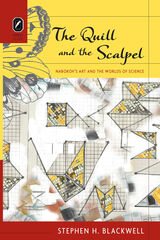
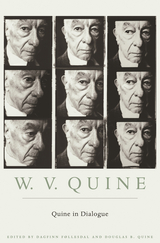
Over the course of his life, W. V. Quine, one of the twentieth century’s great philosophers, engaged and inspired, interviewed and critiqued countless scholars, critics, and students. The qualities that distinguished him in any discussion are on clear display in this volume, which features him in dialogue with his predecessors and peers, his critics and students.
The volume begins with a number of interviews Quine gave about his perspectives on twentieth-century logic, science and philosophy, the ideas of others, and philosophy generally. Also included are his most important articles, reviews, and comments on other philosophers, from Rudolf Carnap to P. F. Strawson. The book, which contains many previously unpublished manuscripts, concludes with a selection of small pieces, written for a broader public, that give a glimpse of the philosopher’s wide interests, his sense of humor, and his warm relations to friends. The result is a wide-ranging, in-depth, and finely nuanced portrait of the humanity underlying this great twentieth-century thinker’s philosophy.
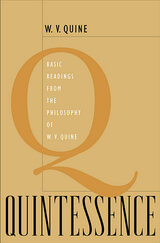
Through the first half of the twentieth century, analytic philosophy was dominated by Russell, Wittgenstein, and Carnap. Influenced by Russell and especially by Carnap, another towering figure, Willard Van Orman Quine (1908–2000) emerged as the most important proponent of analytic philosophy during the second half of the century. Yet with twenty-three books and countless articles to his credit—including, most famously, Word and Object and "Two Dogmas of Empiricism"—Quine remained a philosopher's philosopher, largely unknown to the general public.
Quintessence for the first time collects Quine's classic essays (such as "Two Dogmas" and "On What There Is") in one volume—and thus offers readers a much-needed introduction to his general philosophy. Divided into six parts, the thirty-five selections take up analyticity and reductionism; the indeterminacy of translation of theoretical sentences and the inscrutability of reference; ontology; naturalized epistemology; philosophy of mind; and extensionalism. Representative of Quine at his best, these readings are fundamental not only to an appreciation of the philosopher and his work, but also to an understanding of the philosophical tradition that he so materially advanced.
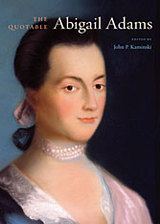
John Adams wrote to his wife Abigail that her letters “give me more entertainment than all the speeches I hear. There is more good Thoughts, fine strokes and Mother Wit in them than I hear in the whole Week. An Ounce of Mother Wit is worth a Pound of Clergy.” The Quotable Abigail Adams invites you to enjoy Abigail Adams’s wit and wisdom on a wide range of subjects, drawn from writings throughout her lifetime. Abigail shared her penetrating and often humorous observations with correspondents ranging from friends and neighbors to family members to heads of state, offering lively opinions on human nature, politics, culture, and family life. Selected and arranged by topic, these quotations provide an entertaining introduction to the thought and character of America’s founding mother. They are accompanied by a biographical introduction, source notes, chronology, and a comprehensive index, making this book the primary resource for those meeting this remarkable woman for the first time as well as for her longtime admirers.
“The Service of this Government is not a Bed of Roses, in any department of it.”
“A Nation which does not respect itself, cannot expect to receive it from others.”
“Gentlemen are not half as particular as the Ladies are in their details.”
“No woman of sense will ever make her Husband an object of Ridicule; for in proportion as she lowers him she lessens herself.”
“A woman may forgive the man she loves an indiscretion, but never a neglect.”
“There is no musick sweeter in the Ears of parents, than the well earned praises of their children.”
“Better is a little contentment than great Treasure; and trouble therewith.”
“Time, which improves youth, every year furrows the brow of age."
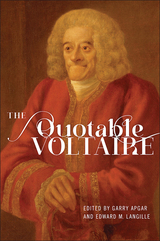
Drawing from a wide range of his publications, private letters, and remarks recorded by his contemporaries, The Quotable Voltaire includes material never before gathered in a single volume. English translations appear alongside the original French, and each quote is thoroughly indexed and referenced, with page numbers for both the first known publication edition of each entry and the most recent edition of Voltaire’s works. The book also features over 400 quotes about Voltaire, including commentary by eighteenth-century luminaries like Samuel Johnson, Catherine the Great, Casanova, and John Adams, as well as an eclectic assortment of modern-day personages ranging from Winston Churchill and Jorge Luis Borges to Mae West and Mike Tyson.
Lavishly illustrated with nearly three dozen images of Voltaire-related art, this collection opens with a scholarly essay that recounts the great man’s life and reflects on his outsized influence on Western culture. Whether you are a Voltaire scholar or a neophyte, The Quotable Voltaire is the perfect introduction to a brilliant mind.
READERS
Browse our collection.
PUBLISHERS
See BiblioVault's publisher services.
STUDENT SERVICES
Files for college accessibility offices.
UChicago Accessibility Resources
home | accessibility | search | about | contact us
BiblioVault ® 2001 - 2024
The University of Chicago Press









